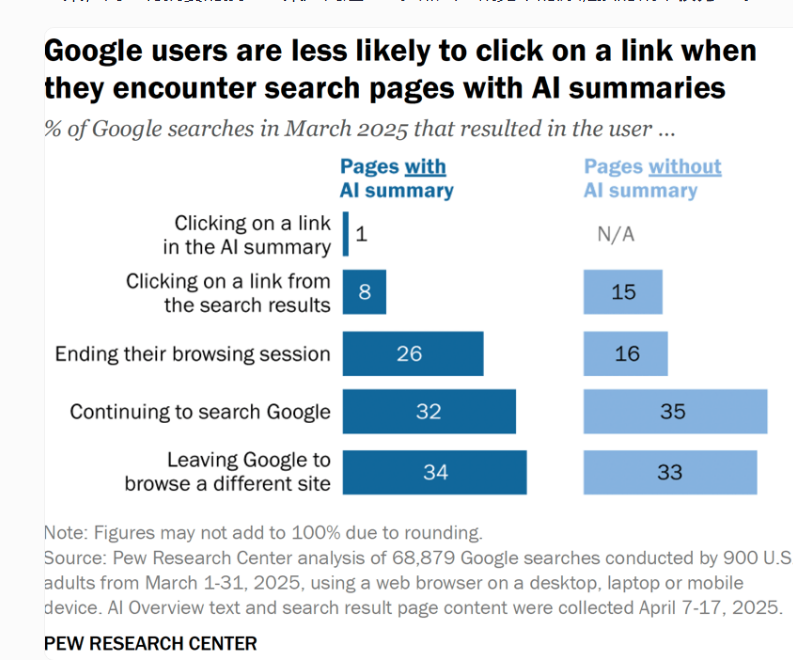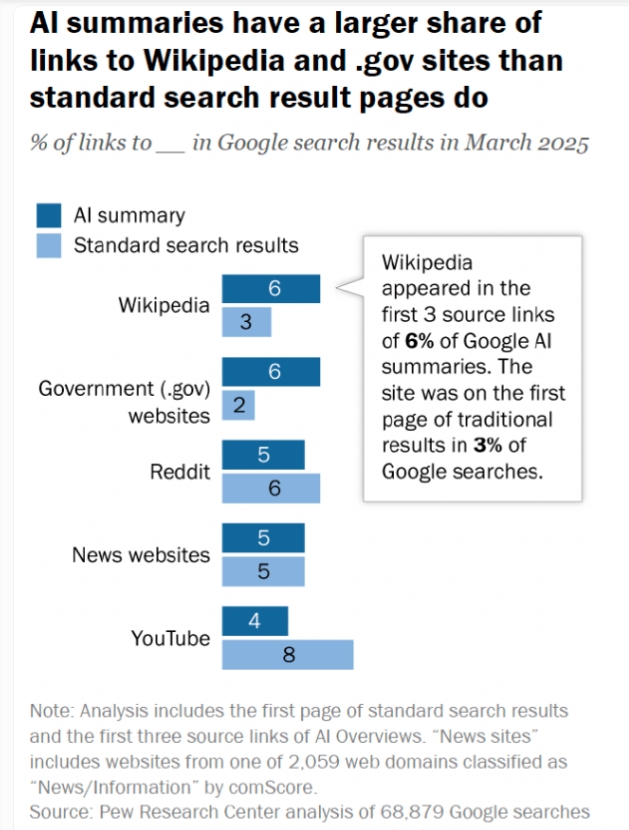According to a recent study by the Pew Research Center, Google's AI Overview feature is significantly changing users' search habits and causing a substantial drop in traffic to external websites. The study shows that when Google provides AI-generated summaries at the top of search results, users are much less likely to click on other websites, often ending their search after reading the summary.
AI Overview: The New Normal in User Search Behavior
The Pew Research Center analyzed the online activity of 900 American adults in March 2025, tracking nearly 69,000 Google searches. The results were startling: only 8% of users clicked on standard search results in searches with AI Overviews, a rate far lower than the 15% click-through rate without AI summaries. More notably, users clicked on the source links provided in the AI Overview only 1% of the time.

For website owners hoping to attract visitors, Google's AI-generated answers have made it more difficult for them to gain clicks through search. | Image: Pew Research Center
This impact is not only reflected in the decrease in clicks but also in users' tendency to end their search within the Google platform. In cases where AI Overviews were used, 26% of users chose to stop browsing on Google, compared to only 16% for those using standard search results. This means that AI Overviews make it more likely for users to leave directly after getting their answers, without visiting other websites.
The frequency of AI Overviews is closely related to the length and type of search queries. Only 8% of one- or two-word queries triggered an AI summary, but this percentage jumped to 53% for searches of ten words or longer. Additionally, if a question starts with "who," "what," or "why," there is a 60% chance of receiving an AI Overview answer.
Winners and Losers: A New Landscape of Traffic Distribution
88% of the summaries in AI Overviews link to at least three sources. Wikipedia, government domains (.gov), Reddit, news organizations, and YouTube are common sources. Compared to traditional search results, Wikipedia and .gov sites appear more frequently in AI Overviews, while YouTube is more prominent in standard search results. Reddit and news websites account for approximately 5% of links in both formats.
Evidently, when Google's AI Overview determines clicks, Wikipedia and government websites are the biggest "winners."
For news publishers, this is undoubtedly a blow. Google's reliance on news websites has long been a pain point in the industry, and disputes between publishers and Google over content usage have never ceased. The rise of AI summaries is sure to intensify these conflicts.
Furthermore, regulators face a bigger issue: is Google gradually becoming a media company and thus potentially facing regulatory risks? This is clearly a label that Google does not want to be associated with.

Evidently, when Google's AI Overview determines clicks, Wikipedia and government websites are the biggest "winners." | Image: Pew Research Center
Support from Other Studies: The Drop in Traffic May Be Even Greater
The findings of the Pew Research Center align with recent independent studies, further confirming that AI Overviews are reshaping people's search habits, keeping users more "trapped" within the Google ecosystem, and reducing interaction with external content. This contrasts sharply with Google's claim that AI answers may bring more clicks to websites.
A recent analysis by Ahrefs found that AI Overviews caused a 34.5% drop in click-through rates for top search results. Another user experience study revealed even more significant declines: external website clicks dropped by two-thirds on desktops and nearly half on mobile devices after using AI Overviews. Many users felt that the AI Overview provided sufficient information, so they left Google without clicking any other links.
For publishers, online stores, and content creators, this means a sharp decline in potential traffic and increased reliance on Google ads. Once the "open web" of free information, it is gradually giving way to a more centralized and possibly Google-controlled AI interface.
It is reported that Google plans to roll out AI Overviews globally and has already begun testing a broader redesign called "AI Mode." At the same time, companies like OpenAI and Perplexity are also actively developing similar search systems.
